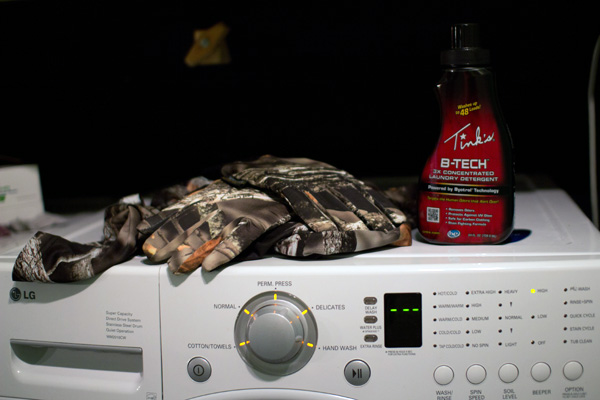LAST UPDATED: May 1st, 2015
You stink. I stink. We all stink…..to a deer, anyway. No question, the one defense mechanism of the white-tailed deer that is the most difficult for bowhunters to defeat is its sense of smell. The whitetail’s nose has been causing bowhunters to cry into their pillows for generations. And, when you look at the physiology, it’s no wonder. Olfactory receptors are sites within the nose that detect odors and then transmit that information to the brain. Humans have about 5 million such receptors. Dogs have about 220 million. Whitetails have 297 million. That’s what bowhunters go up against each and every time we hit the woods. It is true that archers who don’t pay a lick of attention to scent control kill big, mature bucks every year. Anything is possible once in a while. But talk to bowhunters who consistently tags bucks with impressive headgear year in and year out and you’ll probably find they follow strict scent-control regimens.
Controlling human odor requires a complete system that targets not only the clothing a hunter wears but their body as well.
Understand up front that you are not going to enter the woods 100-percent “stink free” to a deer. It’s just not going to happen. You’re a human; you wear manmade clothing; and you carry manmade gear. You and your gear have odors that deer know don’t belong in their world. Now, having said that, understand that deer aren’t rocket scientists. Just because they get a faint whiff of human scent doesn’t necessarily mean they’re going to turn tail and run. They can catch a little scent and not be alarmed enough to raise the white flag. Give them a nostril full and you can count on an adverse reaction. Therefore, our goal each and every time we hunt should be to try to eliminate as much of our scent as possible, and then play the wind. Even the most scent-conscious bowhunter wouldn’t hunt from a stand that’s upwind from where he expects to see deer. It’s just not smart.
SHOWERING
To a deer, human stink isn’t necessarily what we consider to be “stink”. You see, to a deer, you stink right after you shower with normal soap and shampoo. Why/How? It’s simple. Such products are loaded with perfumes that we find to have pleasing odors. However, those perfumes smell every bit as “human” as our body odor to a deer. So before every hunt, take a shower using non-scented soap and shampoo. Hunting equipment manufacturers have recognized hunters’ desire to have such products, so you can find them just about anywhere hunting gear is sold. They will clean your body and hair of sweat and dead skin cells, as well as the perfumes left by your normal soaps and shampoos.
Not only should clothing be kept clean and scent-free, but also any towels used AFTER showering.
One of the worst things bowhunters can do after taking such a shower is to dry off using the same towels they use every day. Unfortunately, those things are loaded with human stink and perfume, so why would you want to rub them all over your body after you just showered to get rid of human stink? It is good to have a supply of towels laundered in scent-free detergent on hand for your pre-hunt showers. Use them once and then toss them in the wash. Perhaps the most difficult part of this practice is to do it before each and every hunt. Sometimes it’s not convenient. Maybe you want to try to slip in a quick hunt after work, but there’s not enough time to go home and shower. Well, you can pick up human odors everywhere you go and from everything you touch. You have to get rid of those odors before heading into the whitetail’s world…..or risk spooking deer.
CLOTHING
There’s lots of specialty clothing on the market today that’s designed to hold back as much human odor as possible. Robinson Laboratories’ line of ScentBlocker gear is made to do just that. The company’s new Trinity technology is designed to adsorb human odors so they can’t get to a deer’s nose. Cover yourself in such gear from head to toe, and you’ve got a fighting chance. However, don’t forget about your hands because the skin that covers your hands have more sweat glands than most other parts of the body. That means you can leave a heap of your scent in the woods just by touching twigs and leaves on your way to your stand with “ungloved” hands.
To cover your feet, opt for rubber boots. Rubber doesn’t hold onto odors like leather and fabrics. You can also scrub odors out of rubber boots if they do pick up some stink. Of course, if the garments you’re wearing stink, that’s no good. So no matter what kind of clothing you wear into the woods, you’ve got to care for it properly. Do so by washing all of your gear with a scent-free detergent, such as ScentBlocker’s clothes wash. Hang the clothes outside to dry. ScentBlocker clothes with Trinity technology, and any gear with carbon lining, should also be recharged in a dryer after they hang dry.
Scent-free clothing is only as good as the process used to keep them clean. Store everything you plan to take into the woods in an air-tight container until it is time to hunt.
When everything is ready to wear, seal them in a scent-proof container. A lot of bowhunters like using plastic tubs, but some complain such containers smell like plastic. If you’re worried about your clothes smelling like polypropylene, try storing them in scent-free bags, like Tink’s carbon bag. Carry your clothes in their storage containers to the field with you. Don’t wear them in the truck, or they’ll just pick up odors from the cab. It might be a bit chilly stripping down to your skivvies to dress in the field, but at least your outer hunting clothes will remain as scent free as possible.
SCENT KILLERS
Now that you’re parked at your hunt site, and you’re making final preparations to hit the field, it’s time to spray yourself and everything you plan to haul to your stand with a scent-elimination product. Try to pay particular attention to your boots. These should never be worn anywhere other than the field. Don’t wear them into the gas station store to get your morning coffee. Don’t wear them into the sporting goods supply store to pick up a few odds and ends before a night in the stand. The best way to control scent on your boots is not to expose them to odor-causing materials, like gas or floor cleaners. You can avoid touching branches and leaves in the woods with your hands, but there’s no way to keep your boots from touching the ground. Rest assured, if you leave behind some scent there, the resident deer will find it.
Tink’s B-Tech Odor Eliminator is designed to destroy over 300 odor-producing compounds generated by the human body and the environment.
As we discussed earlier, even if you take all these measures you will still give off some odor that a wily deer might detect. Your hope has to be that enough of your scent is eliminated or held back that an approaching buck doesn’t detect it, or can’t quite process it as danger. A whitetail buck has to win every encounter with the bowhunter chasing him, but the bowhunter only has to win once.
Proper scent control efforts will go a long way toward filling your tag on a mature whitetail this season.
Practicing strict scent control can be a hard pill for many bowhunters to swallow. And truth be told, if you’re just after any deer, or any buck, spooking deer every now and then isn’t a death sentence for your season. Bucks that are 1.5 and even 2.5 years old won’t necessarily clear out of the county because of one encounter with a human. However, mature bucks are a different story. Bowhunters would be wise to think of them as altogether different animals when compared to young bucks. Bust a 4.5-year-old buck one time with your scent, and you might never see that deer again. So, ask yourself before you head out on your next hunt without taking all these scent-control steps…..is it worth the risk?

 By
By 




